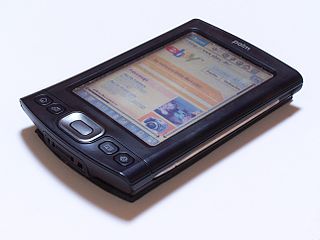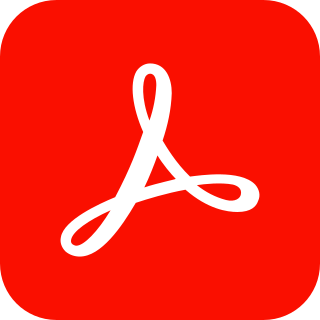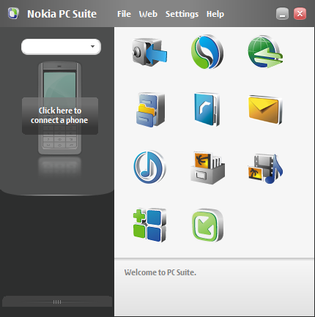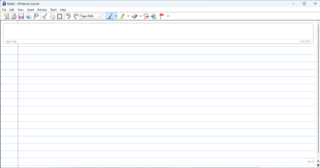
Microsoft Word is a word processor developed by Microsoft. It was first released on October 25, 1983, under the name Multi-Tool Word for Xenix systems. Subsequent versions were later written for several other platforms including: IBM PCs running DOS (1983), Apple Macintosh running the Classic Mac OS (1985), AT&T UNIX PC (1985), Atari ST (1988), OS/2 (1989), Microsoft Windows (1989), SCO Unix (1990), macOS (2001), Web browsers (2010), iOS (2014) and Android (2015). Using Wine, versions of Microsoft Word before 2013 can be run on Linux.

Microsoft Office, or simply Office, is a family of client software, server software, and services developed by Microsoft. It was first announced by Bill Gates on August 1, 1988, at COMDEX in Las Vegas. Initially a marketing term for an office suite, the first version of Office contained Microsoft Word, Microsoft Excel, and Microsoft PowerPoint. Over the years, Office applications have grown substantially closer with shared features such as a common spell checker, Object Linking and Embedding data integration and Visual Basic for Applications scripting language. Microsoft also positions Office as a development platform for line-of-business software under the Office Business Applications brand.

A personal digital assistant (PDA) is a multi-purpose mobile device which functions as a personal information manager. PDAs have been mostly displaced by the widespread adoption of highly capable smartphones, in particular those based on iOS and Android, and thus saw a rapid decline in use after 2007.

A Pocket PC is a class of personal digital assistant (PDA) that runs the Windows Mobile or Windows Embedded Compact operating system that has some of the abilities of modern desktop PCs. The name was introduced by Microsoft in 2000 as a rebranding of the Palm-size PC category. Some of these devices also had integrated phone and data capabilities, which were called Pocket PC Phone Edition. Windows "Smartphone" is another Windows CE based platform for non-touch flip phones or dumber phones.

Adobe Acrobat is a family of application software and Web services developed by Adobe Inc. to view, create, manipulate, print and manage Portable Document Format (PDF) files.
Microsoft Compiled HTML Help is a Microsoft proprietary online help format, consisting of a collection of HTML pages, an index and other navigation tools. The files are compressed and deployed in a binary format with the extension .CHM, for Compiled HTML. The format is often used for software documentation.

A handheld personal computer (PC), typically built around either a clamshell form factor or a gaming form factor with a gamepad integrated for video games, is a mobile device that is significantly smaller than any standard personal computer (PC), but based on the same principles as PCs. The clamshell form factor is sometimes referred to as a palmtop computer, not to be confused with Palmtop PC which was a name used mainly by Hewlett-Packard.
Open XML Paper Specification is an open specification for a page description language and a fixed-document format. Microsoft developed it as the XML Paper Specification (XPS). In June 2009, Ecma International adopted it as international standard ECMA-388.

Windows SideShow was a feature by Microsoft introduced in Windows Vista to supply information such as e-mail, instant messages, and RSS feeds from a personal computer to a local or remote peripheral device or display. SideShow was intended to enhance the Windows experience by enabling new mobility scenarios for the Windows platform and by providing power saving benefits as part of Microsoft's broader efforts regarding a mobile initiative.

Nokia PC Suite is a discontinued software package used to establish an interface between Nokia mobile devices and computers that run the Microsoft Windows operating system. Its first release was in 1997, originally called Nokia Data Suite. It was replaced by Nokia Suite and integrated into the Ovi service suite.
Mobipocket SA was a French company incorporated in March 2000 that created the .mobi e-book file format and produced the Mobipocket Reader software for mobile phones, personal digital assistants (PDA) and desktop operating systems.

Zune is a discontinued software program that was developed by Microsoft for Windows that functions as a full media player, library, media streaming server, mobile device management, and interface for the discontinued Zune Marketplace. The software is used to sync with all devices with Zune functionality including the Zune 4, 8, 16, 30, 80, 120, Zune HD, Windows Phone 7, and Microsoft Kin. Zune devices work exclusively with the Zune software, which applies many design principles of Microsoft's Metro design language.
Windows Imaging Component (WIC) is a COM-based imaging codec framework introduced in Windows Vista (and later available in Windows XP Service Pack 3) for working with and processing digital images and image metadata.
The following is a comparison of e-book formats used to create and publish e-books.

Ovi by Nokia was the brand for Nokia's Internet services. The Ovi services could be used from a mobile device, computer or via the web. Nokia focused on five key service areas: Games, Maps, Media, Messaging and Music. Nokia's aim with Ovi was to include third party developers, such as operators and third-party services like Yahoo's Flickr photo site. With the announcement of Ovi Maps Player API, Nokia started to evolve their services into a platform, enabling third parties to make use of Nokia's Ovi services.

Windows Journal is a discontinued notetaking application, created by Microsoft and included in Windows XP Tablet PC Edition as well as selected editions of Windows Vista and later. It allowed the user to create and organize handwritten notes and drawings, and to save them in a .JNT file, or export them in TIFF format. It can use an ordinary computer mouse to compose a handwritten note, as well as a graphics tablet or a Tablet PC.
Bluefire Reader is an e-book reader application for Android, iOS and Windows operating systems that supports white-labelling. It supports the EPUB and PDF formats for digital publications and incorporates facilities for browsing online catalogs, and downloading them directly into the user's personal library. The application features a library that lets users navigate their collection of eBooks, as well as provides a customizable reading experience through configurable font and background color, font size and type, margin size, display brightness, page turn mode, etc. Additionally, the application allows users to import their own books to read them on the go.

OfficeSuite is a cross-platform office suite application developed by MobiSystems. It has versions for Android, iOS and Microsoft Windows (PC) and adds extensive PDF abilities to its compatibility with the most frequently used Microsoft Office file formats. The software has over 220 million downloads on Google Play and is among the top Android business applications.












